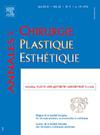[有用的额头,受损的额头,但额头......修复了!]
IF 0.5
4区 医学
Q4 SURGERY
引用次数: 0
摘要
额头虽然有时会被流苏遮住,但它是面部的一个重要区域,能显示出许多表情,如疲劳、惊讶、担忧、愤怒......在整形外科手术中,额头经常被用作供体部位。本文将从三个方面进行探讨:使用过的前额、创伤过的前额和修复过的前额。前额具有优质无毛皮肤,且靠近面部高贵结构,是一个重要的供体部位。前额皮瓣常用于鼻部重建,有多种变体以满足不同需求。其他有蒂皮瓣,如眉上皮瓣和鹤骨皮瓣,也用于各种面部重建。前额可能受到外伤、烧伤、血管病变和皮肤肿瘤的影响。我们对线性硬皮病尤其感兴趣,这是一种自身免疫性疾病,会导致皮肤和皮下纤维化,有时还伴有帕里-罗姆伯格综合征。此外,面神经颞支的病变会导致肌肉麻痹,影响额部的美观和功能。准确了解神经通路的解剖结构对于避免先天性损伤至关重要。整形外科的所有手段都可用于修复前额。控制伤口愈合、张力缝合和使用局部皮瓣是修复前额的关键技术。张力缝合对小的物质损失特别有效,其方向取决于位置。推进瓣、旋转瓣和转位瓣可用于物质损失较大的情况。植皮虽然不太美观,但有时也是必要的。皮肤扩张术虽然在社会上受到限制,但可用于治疗先天性巨痣和增加前额皮瓣的表面积。本文章由计算机程序翻译,如有差异,请以英文原文为准。
Le front utilisé, le front traumatisé, mais le front… réparé !
Le front, bien que parfois caché par une frange, est une région majeure du visage révélant de nombreuses expressions comme la fatigue, la surprise, l’inquiétude, la colère… En chirurgie réparatrice, le front est fréquemment utilisé comme site donneur. Cet article examine trois aspects : le front utilisé, traumatisé, et réparé. Le front, grâce à sa peau glabre de haute qualité et sa proximité des structures nobles du visage, est un site donneur central. Le lambeau frontal est couramment utilisé pour la reconstruction nasale, avec plusieurs variantes pour répondre à différents besoins. D’autres lambeaux pédiculés, comme le lambeau suprasourcilier et le lambeau grue, sont également utilisés pour diverses reconstructions faciales. Le front peut être affecté par des traumatismes, brûlures, lésions vasculaires, et tumeurs cutanées. Nous développons particulièrement la sclérodermie en coup de sabre, une maladie auto-immune qui provoque une fibrose cutanée et sous-cutanée parfois associée au syndrome de Parry Romberg. Par ailleurs, les lésions de la branche temporale du nerf facial entraînent une paralysie musculaire, affectant l’esthétique et la fonction de la région frontale. Connaître précisément l’anatomie du trajet nerveux est crucial pour éviter les lésions iatrogènes. C’est l’ensemble de l’arsenal de la chirurgie reconstructrice qui est utile à la réparation du front. La cicatrisation dirigée, la suture en tension, et l’utilisation de lambeaux locaux sont des techniques clés pour la réparation du front. Les sutures en tension sont particulièrement efficaces pour les petites pertes de substance, et leur orientation dépend de la localisation. Les lambeaux d’avancement, de rotation, et de transposition sont employés pour des pertes de substance plus importantes. Les greffes de peau, bien que moins esthétiques, sont parfois nécessaires. L’expansion cutanée, bien que socialement contraignante, est utilisée pour traiter des nævi géants congénitaux et augmenter la surface des lambeaux frontaux.
The forehead, although sometimes hidden by a fringe, is a major region of the face revealing many expressions such as fatigue, surprise, concern, anger… In reconstructive surgery, the forehead is frequently used as a donor site. This article looks at three aspects: the used, traumatised and repaired forehead. The forehead, with its high-quality hairless skin and proximity to the noble structures of the face, is a central donor site. The forehead flap is commonly used for nasal reconstruction, with several variations to meet different needs. Other pedicled flaps, such as the supra-eyebrow flap and the crane flaps, are also used for various facial reconstructions. The forehead can be affected by trauma, burns, vascular lesions and skin tumours. We are particularly interested “en coup de sabre” linear scleroderma, an autoimmune disease that causes cutaneous and subcutaneous fibrosis, sometimes associated with Parry Romberg syndrome. In addition, lesions of the temporal branch of the facial nerve lead to muscular paralysis, affecting the aesthetics and function of the frontal region. Precise knowledge of the anatomy of the nerve pathway is crucial to avoid iatrogenic lesions. The entire arsenal of reconstructive surgery is useful for repairing the forehead. Controlled wound healing, tension suturing and the use of local flaps are key techniques for repairing the forehead. Tension sutures are particularly effective for small losses of substance, and their orientation depends on the location. Advancement, rotation and transposition flaps are used for larger losses of substance. Skin grafts, although less aesthetic, are sometimes necessary. Skin expansion, although socially restrictive, is used to treat congenital giant nevi and increase the surface area of forehead flaps.
求助全文
通过发布文献求助,成功后即可免费获取论文全文。
去求助
来源期刊
CiteScore
1.00
自引率
0.00%
发文量
86
审稿时长
44 days
期刊介绍:
Qu''elle soit réparatrice après un traumatisme, pratiquée à la suite d''une malformation ou motivée par la gêne psychologique dans la vie du patient, la chirurgie plastique et esthétique touche toutes les parties du corps humain et concerne une large communauté de chirurgiens spécialisés.
Organe de la Société française de chirurgie plastique reconstructrice et esthétique, la revue publie 6 fois par an des éditoriaux, des mémoires originaux, des notes techniques, des faits cliniques, des actualités chirurgicales, des revues générales, des notes brèves, des lettres à la rédaction.
Sont également présentés des analyses d''articles et d''ouvrages, des comptes rendus de colloques, des informations professionnelles et un agenda des manifestations de la spécialité.

 求助内容:
求助内容: 应助结果提醒方式:
应助结果提醒方式:


